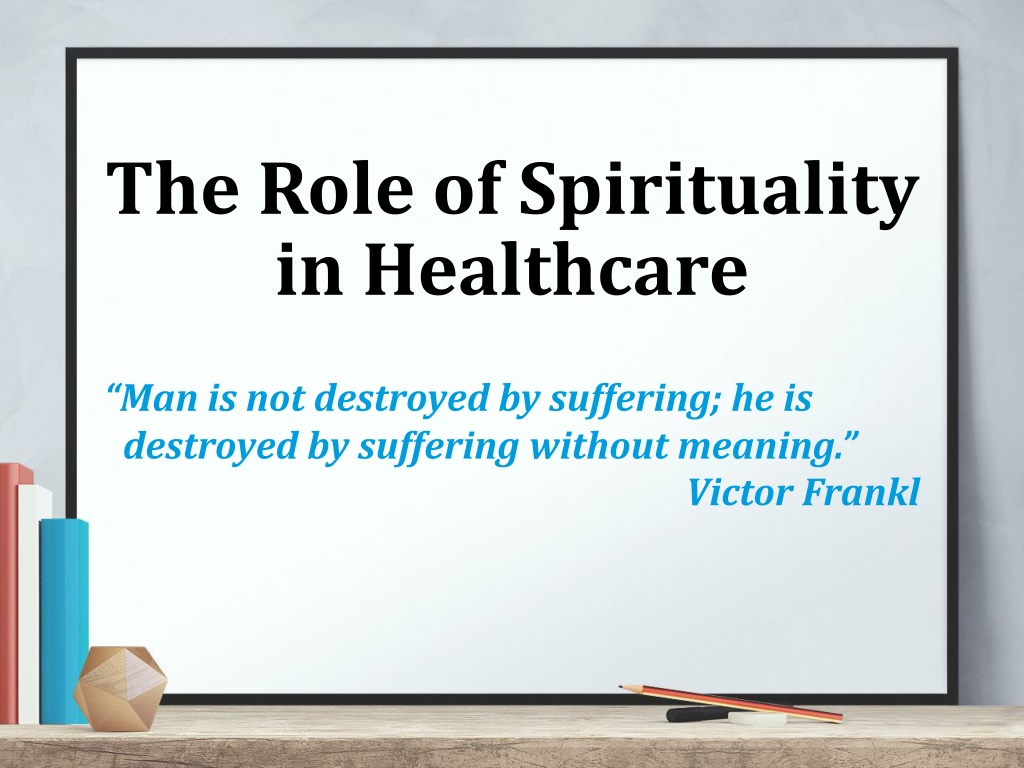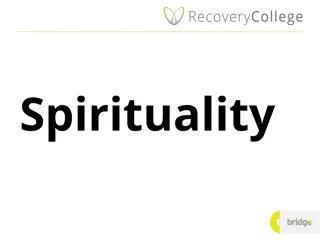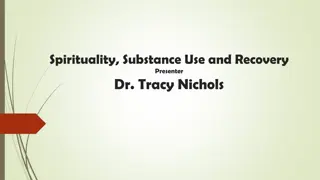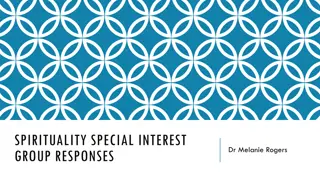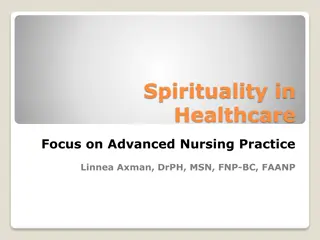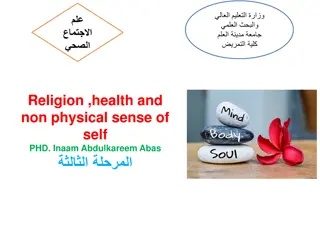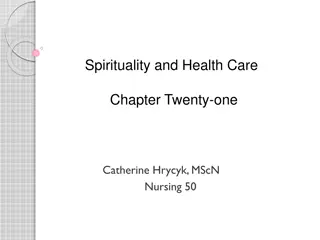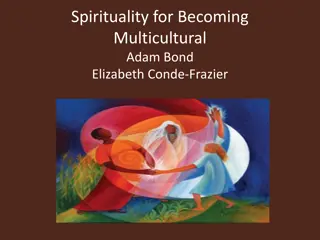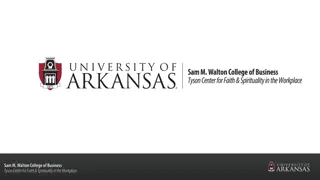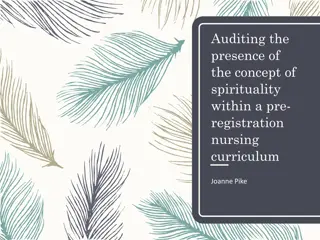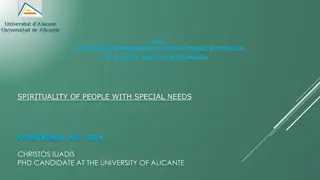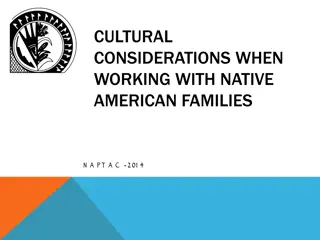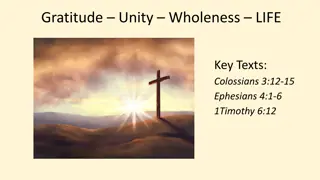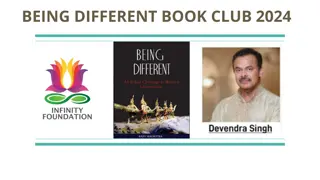Exploring Spirituality and Wholeness in Healthcare
Understanding the significance of spirituality in healthcare, integrating physical, emotional, psychological, and spiritual aspects for wholeness. Distinguishing between spirituality and religion, focusing on internal experiences of purpose, connectedness, and transcendence. Emphasizing the importance of finding meaning in suffering and the holistic nature of human well-being within the hospital context.
Download Presentation

Please find below an Image/Link to download the presentation.
The content on the website is provided AS IS for your information and personal use only. It may not be sold, licensed, or shared on other websites without obtaining consent from the author. Download presentation by click this link. If you encounter any issues during the download, it is possible that the publisher has removed the file from their server.
E N D
Presentation Transcript
The Role of Spirituality in Healthcare Man is not destroyed by suffering; he is destroyed by suffering without meaning. Victor Frankl
We are not human beings having a spiritual experience. We are spiritual beings having a human experience. Pierre Teilhard de Chardin
Opening Question What is unique about the hospital context?
The Hospital Context Wellness and wholeness in disrepair Physical pain Sense of dislocation Sense of isolation Circumstance of change and possibly new way of life Existential suffering triggered by hospital event
Wholeness What qualities make up a sense of wholeness?
Wholeness Physical well-being Psychological well-being Emotional well-being Spiritual well-being religious beliefs meaning/purpose/hope connectedness to self, others, nature, transcendent/sacred
Integrated Wholeness Wholeness takes into account the holistic nature of humanness. The physical, emotional, intellectual, psychological, and spiritual aspects of self are interconnected. If one aspect is affected, the others are as well. Thus, to neglect the spiritual aspect is to neglect an inherent need.
Spirituality How would you define spirituality?
Spirituality vs. Religion Religion: Outward expression of specific set of beliefs and values shared in common by a specific community. formal belief system; doctrines rituals, sacraments, practices Fosters, promotes, and supports spirituality Spirituality: Interior experience of meaning, wholeness, purpose, connectedness to something bigger and transcendent Does not always involve formal religious beliefs and practices Does not have to be communal (Wintz, 2017)
Spiritual but Not Religious Pew study shows that 37% of Americans consider themselves spiritual but not religious. (Pew Research Study, 2012) Some expressions of spirituality: Relationships: family, friends Nature: hiking, appreciating beauty/wonder Meditation/Prayer: time spent in silence Exercise: martial arts, yoga, running/walking Music: listening, composing, playing Art: creating, appreciating (Wintz, 2017)
Spirituality Spirituality is a dynamic and intrinsic aspect of humanity through which persons seek ultimate meaning, purpose, and transcendence, and experience relationship to self, family, others, community, society, nature, and the significant or sacred. Spirituality is expressed through beliefs, values, traditions, and practices. C. Puchalski and R. Vitillo, et al., 2014
Spirituality Defined by Volunteer A conscious realization of an inner joy a spirit of being loved for a purpose by an inner power you can feel deeply but not adequately explain. Bob Kelly, Spiritual Care Partner (2016 Class)
Discussion Given what we have discussed about spirituality, what is the role of the spiritual caregiver in the hospital context?
Role of the Spiritual Caregiver Trade: story-listeners, facilitators of storytelling Accompany patients, comfort them, hold the pain with them, validate their feelings, encourage them, offer them tissues All of which communicates, You are not alone. We don t give patients advice or admonish them. Job: 2:11-13 The pastoral care of Job s friends Job was suffering, which caused him spiritual distress. His friends held the pain with him at the start but then tried to fix him.
Role of the Spiritual Caregiver We extend compassion Definition of compassion: to suffer with Compassion is not a relationship between the healer and the wounded. It's a relationship between equals. Only when we know our own darkness can we be present with the darkness of others. Compassion becomes real when we recognize our shared humanity. Pema Chodron, 2002
Role of the Spiritual Caregiver We seek not to fix, but to understand without judging. What do we seek to understand? A patient s story What do we seek to do? Help people discover meaning in their story as it is being played out in the present moment.
Spirituality Revisited Spirituality involves the process of discovering meaning, purpose, and self-understanding in the midst of one s life story. The role of the spiritual caregiver is to journey with peopleon their story-journeys, discerning with them possibilities for hope and helping them gain a fuller sense of selfhood.
What Studies Show Spiritual Care increases the quality of life at the end of life. Support of terminally ill patients spiritual needs by the medical team is associated with greater hospice utilization and, among high religious copers, less aggressive care at EoL. Spiritual care is associated with better patient QoL near death. (Balboni, et al., 2010)
Concluding Thought One can still experience healing and meaning in the midst of declining health. Spiritual care helps bring this about. Cure is not possible for many illnesses, but I firmly believe that there is always room for healing. Healing can be experienced as acceptance of illness and peace with one s life. This healing, I believe, is at its core spiritual. Christina Puchalski, 2001
Sources Balboni, Tracy A. MD, et al. (2010). Provision of Spiritual Care to Patients With Advanced Cancer: Associations With Medical Care and Quality of Life Near Death. Journal of Clinical Oncology, 28(3), pp.445-52. Chodron, Pema. The Places that Scare You: A Guide to Fearlessness in Difficult Times.Boulder, CO: Shambhala, 2002. Frankl, Victor E. Man s Search for Meaning. New York: Simon and Schuster, 1984. Pew Research Center Study: Nones on the Rise: One-in-Five Adults Have No Religious Affiliation (2012); https://www.pewforum.org/2012/10/09/nones- on-the-rise/ Puchalski, Christina, MD, MS. (2001). The Role of Spirituality in Health Care. Baylor University Medical Center Proceedings, 14(4), pp. 352-357. Puchalski, Christina, MD, MS, FACP, Vitillo, Robert, MSW, ACSW, et al. Improving the Spiritual Dimension of Whole Person Care: Reaching National and International Consensus. Journal of Palliative Medicine, 2014 Jun 1; 17(6): 642- 656. Wintz, Rev. Sue, MDiv, BCC. Chaplaincy Care Volunteer Training Manual, 2nd Ed. New York: HealthCare Chaplaincy Network, 2017: pgs. 8-10.
